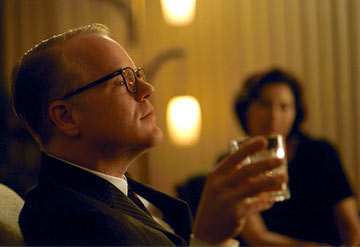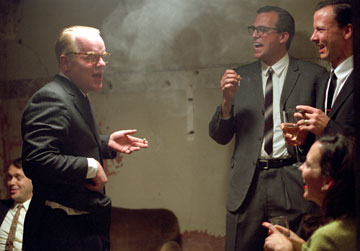

Everybody who watches a lot of movies knows that Philip Seymour Hoffman is a really good actor. He's an actor's actor, who chooses a wide variety of roles. Although he has taken the lead in a few movies, he typically shows up as a supporting actor in some fashion or another. Capote is his chance to break into the big time. It is a bold yet nuanced performance of a deeply flawed (and historical) figure that is one of the best performances this year. This is the kind of performance that gets an actor noticed during awards season, which will further heighten his profile in the eyes of the public.
Hoffman (Along Came Polly, Cold Mountain) is the famed Truman Capote, full-time socialite and author of Breakfast at Tiffany's. He hob-knnobbed with movie stars and would talk about himself endlessly. It's very easy to turn Capote into a caricature; he dressed very fey and had a high-pitched voice. The people he met in Kansas surely thought he was some sort of alien. Instead, Hoffman tones down the easy stereotyping and focuses on the man behind the surface. Capote follows him as he wrote his masterpiece In Cold Blood, the first "non-fiction novel" that revolutionized the publishing industry and brought him oddles of fame. It was also the last book he wrote (well, it turns out the recently discovered Summer Crossing will be published shortly). While the success of In Cold Blood brought him fame, it also came at a heavy personal cost. Director Bennett Miller (The Cruise) and adapter Dan Futterman based the movie on the book by Gerald Clarke, which traces Capote's personal downfall.
Capote went to Kansas to write a magazine article about Perry Smith (Clifton Collins, Jr., Mindhunters, The Rules of Attraction) and Richard Hickcock (Mark Pellegrino, National Treasure, Twisted), two men who brutally murdered a family. As he researched the case with his assistant Nelle Harper Lee (Catherine Keener, The 40 Year Old Virgin, The Interpreter), yes, that Harper Lee (for anybody who doesn't understand the reference look up the author of To Kill a Mockingbird), he realized that he had enough material for a book. He wanted to delve into all aspects of the murder. He interviewed family and friends, Alvin Dewey (Chris Cooper, The Bourne Supremacy, Silver City), the law enforcement official in charge of the investigation, and most importantly, Smith and Hickcock.
Capote becomes especially close to Smith, who is extremely intelligent. He sees the two as kindred spirits who went on wildly different paths in life. This leads him to find new, capable lawyers for the pair. Of course, the lawyers appeal their conviction, which infuriates Dewey. For Capote, this is a way to add more material to his book and help his new friend Smith. As the book progresses and the appeals drag on, Capote realizes that he needs an ending to his novel, and this is where his downfall begins. Capote knows that the way to end his novel is for the two convicted men to die. He pretends that he is doing what he can to help them, but in reality is backing off so that they will finally die. But how much does fame cost? This is the question that damns him. He realizes that his success relies on the death of two people, and it eats away at him. At the same time, it is a price he is more than willing to pay, and he lies through his teeth to his 'friend' Smith. It's fascinating to watch Hoffman portray a man wrestling with his conscience. In the end, greed won, but at a huge cost. Capote never finished another book and as the years progressed, he became a drunken caricature of himself.